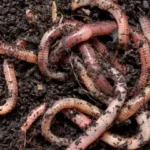If you’ve noticed more ants around your home or garden lately, you’re probably looking for practical solutions to manage them. Dealing with these persistent insects can be frustrating, especially when they invade your living spaces. This guide will introduce you to beneficial nematodes for ants, a natural method that targets ant larvae and can help reduce their populations.
Beneficial nematodes are a natural and effective method for controlling ant populations in gardens. One commonly used species for ant control is Steinernema carpocapsae, which attacks ant larvae, disrupting colonies and naturally reducing ant populations. These microscopic, soil-dwelling organisms belong to the phylum Nematoda. They specifically target pest insects, including ants, by entering their bodies and releasing symbiotic bacteria that kill the host from within.
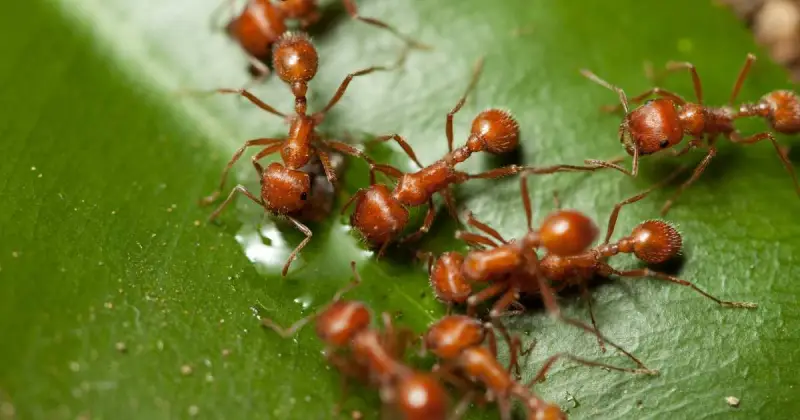
As you continue reading, you’ll discover how to select the correct type of nematodes and discover the best practices for applying them in your home or garden. This natural approach helps manage ant populations and maintains the ecological balance, offering you a safer alternative to chemical pesticides. Get ready to reclaim your space from unwelcome ants with this environmentally friendly solution.
Humble Highlights
- Discover how nematodes can help fight against invading ant armies in your garden by providing a dual-action approach to ant control that is both effective and environmentally friendly so you can help protect your crops while helping preserve the natural balance of the surrounding ecosystem.
- Uncover these 4 crucial benefits nematodes can provide for hoarding ant colonies and why choosing the suitable nematode species can make all the difference in your backyard garden so you can keep your vegetables growing strong!
- Save time with these 4 tips for successful nematode application AND why you should always apply them at this crucial time of the day for the best effect so you can ensure they can do their job effectively and work hard on your behalf!
Understanding Beneficial Nematodes
Beneficial nematodes are crucial in managing ant infestations through biological control, effectively targeting destructive pests. These microscopic organisms offer a safe and environmentally friendly option for controlling ant issues without endangering humans, pets, plants, or beneficial insects. They parasitize and exterminate pests like ants, thus helping to maintain ecological balance.

A key characteristic of beneficial nematodes is their ability to interrupt the lifecycle of ant colonies by attacking the larvae. They release bacteria that exterminate pests, leading to the decline of ant populations within 7-10 days. This biological control method keeps ant numbers under control while ensuring safety for other environmental organisms. 1
For optimal results in managing ant infestations, it’s crucial to apply beneficial nematodes correctly and monitor their effectiveness. Understanding how these organisms operate allows us to exploit their capabilities in various environments.
Ant-Controlling Abilities Of Nematodes
Exploring how nematodes control ant populations reveals their strategic methods of disrupting ant colonies. By targeting ants’ developmental stages and causing indirect disruption to the colony’s structure and function, nematodes offer a multifaceted approach to ant control that goes beyond the mere reduction of ant numbers.These nematodes are effective in managing these persistent insects.
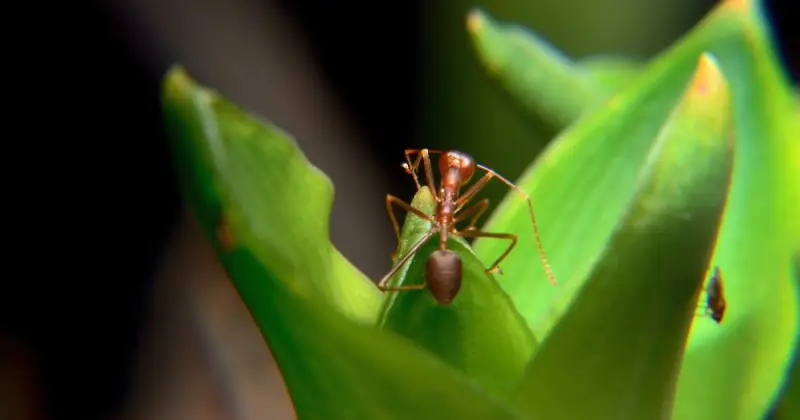
Here are several critical methods by which nematodes exert their influence over ant populations:
- Predatory nematodes infect ant larvae, interrupting the colony’s lifecycle and decreasing ant numbers.
- These organisms emit chemical signals that deter ants, affecting their search for food and disrupting usual activities.
- Applying nematodes can cause ants to move away from treated areas, resulting in fewer ants.
- Different species of ants may react differently to entomopathogenic nematodes, which means strategies must be specifically adapted for effective management. 2
An exciting way nematodes control ants is by disrupting their colony structure and behavior. When nematodes, such as Steinernema carpocapsae, infect ant larvae and pupae, they cause a decline in the young ant population, which is crucial for the colony’s growth and sustainability.
This disruption directly reduces the number of future worker ants. Also, it disturbs the colony’s ability to maintain its labor force and perform essential tasks such as foraging, nest building, and caring for the queen.
Additionally, the stress and mortality caused by nematode infection can lead to changes in the colony’s social dynamics, potentially causing the colony to relocate or fragment.
Application Methods For Ant Infestations
Nematodes can be applied to ant mounds to address ant infestations, effectively controlling their numbers. These organisms parasitize the larvae of ants, interrupting the colony’s lifecycle and reducing their population. Pour a nematode solution onto ant mounds to directly impact the core of the infestation, creating conditions that discourage ants from nesting and foraging in the area.
Strategically applying nematodes may encourage ants to move away from treated areas, thus decreasing their numbers over time. Monitoring the ant populations regularly and applying nematodes multiple times will help ensure long-term control in infested areas. This natural method avoids harmful chemicals and helps maintain ecological balance. 3

Benefits Of Using Nematodes For Ants
Using beneficial nematodes to control ants is a practical and eco-conscious method for addressing ant problems. These microscopic organisms bring several advantages in managing ant infestations:
- Effective Against Larvae: Nematodes specifically target ant larvae, interrupting the colony’s growth cycle and gradually diminishing the population.
- Chemical Deterrents: These organisms emit substances that repel ants, effectively establishing areas free of ants.
- Population Control: By infecting and killing vulnerable larvae, predatory nematodes help reduce the number of ants. 4
- Encourages Relocation: Applying nematodes correctly can encourage ants to move away from treated zones, thus preventing future infestations and fostering a balanced environment.
Remember, incorporating nematodes into your pest control strategy not only assists in managing ant issues but also supports a healthier approach to pest management while not resorting to harsh, synthetic chemical treatments.
Choosing The Right Nematode Species
When choosing nematode species for ant control, matching the nematode to the specific ant species targeted is crucial. For instance, Steinernema carpocapsae nematodes are effective against red imported fire ants. These nematodes specifically attack this type of ant, aiding in population control. On the other hand, Steinernema feltiae nematodes are advisable for common household ants.
| Nematode Species | Target Ant Species | Effectiveness |
|---|---|---|
| Steinernema carpocapsae | Fire Ants (e.g., red imported fire ants) | Effective |
| Steinernema feltiae | Other Ant Species | Suitable for household ants |
Identifying the ant species prevalent in your area is critical to selecting the correct nematode for ant management. By choosing an appropriate nematode, you can directly address the specific ant species causing problems, thus achieving effective control. 5
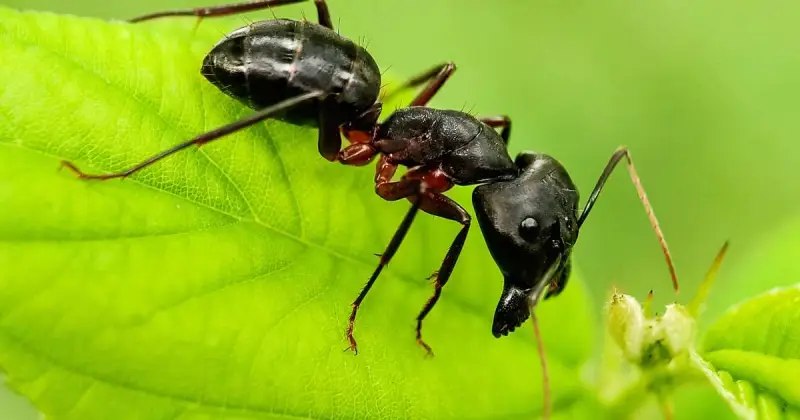
Nematodes vs. Chemical Ant Control
When comparing nematodes to chemical methods for controlling ants, consider these critical aspects:
- Eco-Friendly: Nematodes are a sustainable option that safeguards the ecosystem and non-target insects. 6
- Target Precision: These organisms specifically attack ant larvae, interrupting the colony’s growth cycle while sparing adult ants and other species.
- Habitat Adaptation: As soil inhabitants, nematodes naturally combat subterranean ant populations.
- Natural Parasitism: Nematodes introduce bacteria that specifically parasitize ant larvae, providing an effective biological control strategy.
Opting for nematodes instead of chemicals supports a healthier environment and minimizes the hazards linked to synthetic agents. Utilizing nematodes for ant management allows for robust results without harming the surrounding ecosystem or beneficial insects.
Applying beneficial nematodes to areas where ants are active can significantly decrease their numbers without chemical pesticides, making it an environmentally friendly solution. This biological control method targets ants and benefits the soil ecosystem by maintaining a healthy balance of microorganisms. Check out the informative video below that details the specific steps to follow when applying these invisible garden helpers!
Nematode Life Cycle And Ant Control
Utilizing nematodes for ant control capitalizes on their life cycle to impair colony sustainability. These microscopic organisms specifically target ant larvae, which is crucial in diminishing the ant population. By infecting and subsequently killing these vulnerable larvae, nematodes significantly disrupt the colony’s growth cycle.
Furthermore, predatory nematodes emit chemical signals discouraging ants from entering infested territories, establishing a natural deterrent against these pests. When infected, these insects emit cues that prompt other ants to avoid the area, leading to further colony destabilization.
A thorough understanding of the nematode life cycle and their targeted attack on ant larvae is essential for effective ant management. Applying nematodes reduces the number of ants but also encourages them to move away from treated locations. 7
Tips For Successful Nematode Application
To achieve effective nematode application for controlling ants, prepare the nematode-water mixture properly for uniform distribution. Here are essential steps to follow when applying beneficial nematodes:
- Uniform Mixing: Ensure the nematodes are evenly dispersed in the water to form a consistent solution.
- Optimal Timing: Deploy nematodes during the evening or on overcast days to shield them from UV rays, which enhances their survival and effectiveness.
- Comprehensive Coverage: Distribute the mixture across the area you’re targeting to ensure no spots are missed, optimizing the nematodes’ reach and effectiveness. 8
- Assessment of Results: After the application, monitor the ant population to assess the effectiveness of the treatment and decide whether further applications are necessary.

Integrating Nematodes Into Ant Management
Integrating nematodes into ant management significantly improves pest control by naturally deterring and disrupting ant colonies. Utilizing nematodes in integrated pest management strategies enables effective combat against ant infestations in an environmentally friendly manner.
These microscopic predators infect and eliminate ant larvae, undermining the colony’s lifecycle and progressively decreasing ant numbers. Nematodes also emit chemical signals that repel ants and promote avoidance, aiding in controlling ant populations in targeted areas.
Following the steps to apply nematodes is crucial for maximizing their impact on ants. Recognizing that various ant species may react differently to entomopathogenic nematodes facilitates the development of customized pest control approaches depending on the specific ant problem. 9
Adopting integrated pest management involving nematodes provides a natural method for controlling ants. It supports ecological balance by reducing reliance on harsh chemical pesticides that may disrupt your garden and the surrounding soil. This approach helps achieve sustainable ant management while lessening environmental damage.
A less common way nematodes control ants is by releasing secondary metabolites produced by the symbiotic bacteria they carry. When nematodes, such as Steinernema or Heterorhabditis species, infect ant larvae and pupae, they introduce bacteria into the host’s body.
These bacteria produce toxins and enzymes that kill the host and release metabolites into the surrounding soil. Some metabolites act as chemical deterrents, repelling other ants from the infected area, creating a hostile environment, and discouraging ants from foraging or nesting in the treated zones.
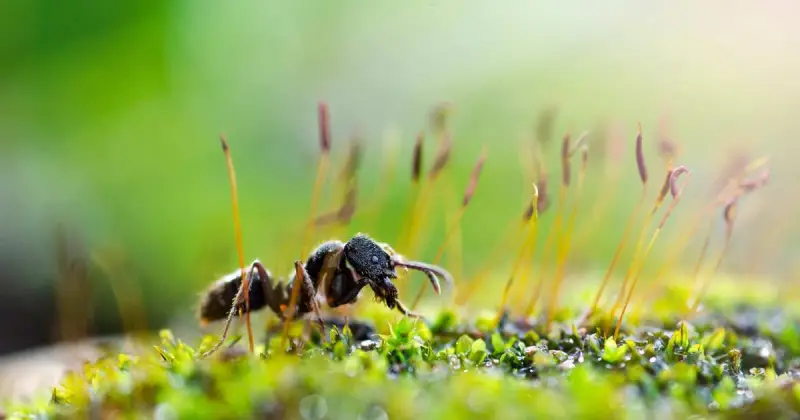
Conclusion
Beneficial nematodes offer a compelling, eco-friendly option for effectively controlling ant populations. These microscopic organisms work hard on your behalf by explicitly targeting and disrupting ant colonies, ensuring a sustainable approach without resorting to toxic chemicals.
For optimal results, it is essential to select and apply the appropriate species of nematodes. Embrace this natural solution and experience the relief of managing ant issues responsibly and efficiently. Let’s make our environments healthier for ourselves and future generations by utilizing the power of nature in our pest control strategies.
Have you successfully used beneficial nematodes on invading ants in your backyard garden? We’d love to hear your success story and how many applications it took! Be sure to comment below!
SOURCES
- National Library Of Medicine, National Center For Biotechnology Information – Nematodes
- National Library Of Medicine, National Center For Biotechnology Information – Potent Ant Deterrents Emitted From Nematode-Infected Insect Cadavers
- University Of Massachusetts, Amherst – Biological Control: Using Beneficial Nematodes
- National Library Of Medicine, National Center For Biotechnology Information – Response Of Ants To A Deterrent Factor(s) Produced By The Symbiotic Bacteria Of Entomopathogenic Nematodes
- Wikipedia – Ant
- United States Department Of Agriculture – Pheromones Give Nematodes A Boost In Controlling Pests
- Alabama A&M & Auburn Universities, Extension – Nematode Control In The Home Vegetable Garden
- Colorado State University, Extension – Insect Parasitic Nematodes
- Mississippi State University, Extension – Nematode Control In The Home Garden


